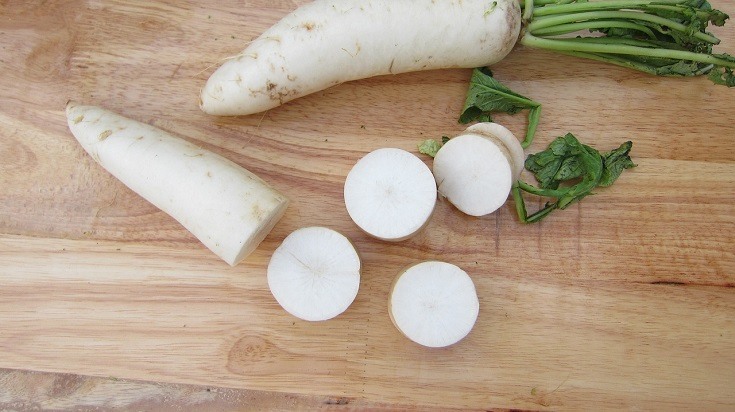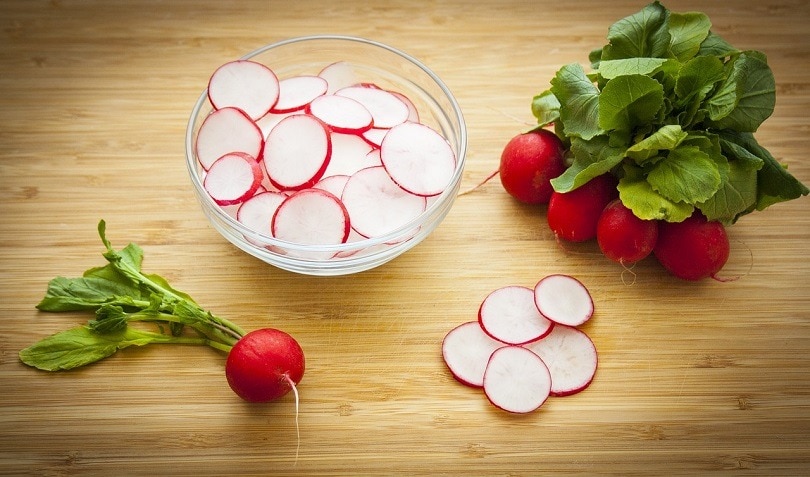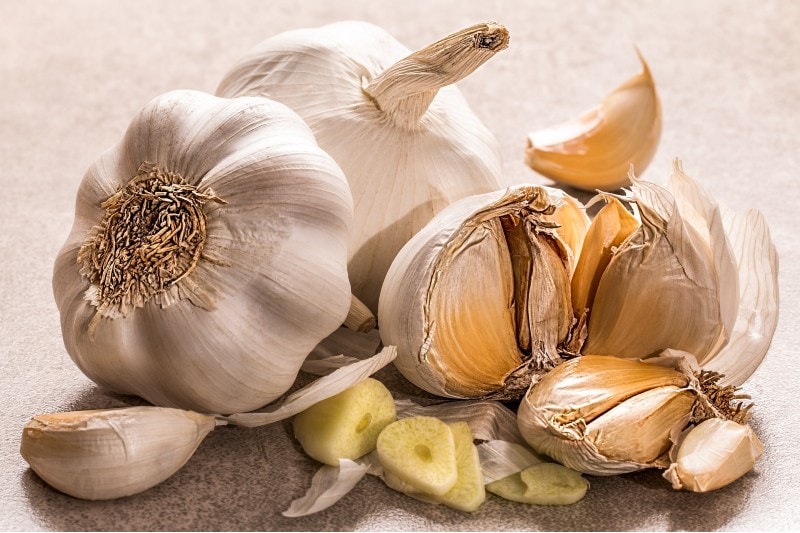As daikon radishes gain popularity in human cuisine, it’s only natural for dog owners to wonder if it’s safe to share this sweet and crunchy vegetable with their pups. The short answer is yes, dogs can eat daikon—not only is it safe, but it’s also packed full of nutrients. That said, some dogs can get an upset stomach from eating raw vegetables, including daikon. Keep reading to learn how you can safely introduce daikon radishes to your dog’s diet!
Can My Dog Eat White Radish?
Daikon, also known as white radish, is low in calories and high in fiber. An adequate amount of fiber in your dog’s diet will help its digestive system by encouraging regular bowel movements and reducing the risk of constipation and diarrhea.
Daikon radishes also contain vitamins C and B6, as well as essential minerals including potassium, which supports a healthy heart and muscles, and calcium, which is used to maintain healthy teeth and bones.
If you’ve never given your dog radishes before, it’s important to introduce them to your dog’s diet gradually, and in small amounts. If your dog has difficulty digesting raw vegetables, feeding them raw daikon may lead to bloating and diarrhea. Pay close attention to your dog’s health after feeding them daikon for the first time, and refrain from giving them more if it doesn’t suit their stomach.
Note that daikon cannot replace your dog’s diet, but when offered in moderate amounts, it can supplement your dog’s high-quality dog food wonderfully—if your dog happens to like the taste!

Preparing Daikon Radish for Dogs
Not all parts of daikon radish are safe for dogs. Radish greens—or leaves—can cause gastroenteritis in dogs, so it’s important to remove and discard these before preparing the rest for your pup.
Make sure you wash and peel the white radish, then cut it up into small chunks to prevent a choking hazard. When the radish is prepared, offer a small amount to your dog to see if they like it. If your dog turns their nose away, fear not! There are plenty of other vegetables you can try incorporating into your dog’s diet, and you can always try feeding them daikon again in the future.
You can also give your dog steamed or cooked daikon, but make sure it hasn’t been seasoned with spices. Always speak to a veterinarian if you are unsure about any aspect of your dog’s diet!
Are All Radishes Safe for Dogs?
Both white and red radishes are safe for dogs, however, horseradish—which isn’t actually a radish—should not be given to dogs.
While horseradish isn’t toxic for dogs, it is very peppery and can cause nose and mouth irritation and discomfort in dogs, as well as gastrointestinal upset.
Even though red and white radishes are safe for dogs, the smaller ones tend to have a stronger, more peppery, taste. Not all dogs will appreciate the taste, though some will love it. It may take a little experimenting to figure out if your dog likes radishes, and if so, which types.

What Vegetables Can’t Dogs Eat?
While daikon radishes—and plenty of other fruit and vegetable options—are safe for your furry friend, there are some fruit and vegetables that are toxic for your dog. When picking food for your dog, avoid the following:
Mushrooms
Poisonous mushrooms can seriously harm your dog, or even lead to death in some circumstances, so make sure you keep your dog away from wild mushrooms. Although washed white mushrooms from the store could potentially be okay for your dog, it’s safer to stay away from mushrooms altogether.
Onions, Leeks, Garlic, and Chives
Onions, leeks, garlic, and chives are part of the same plant species: Alliums. Alliums are poisonous to most animals, including cats and dogs. If your dog consumes Alliums, it can cause diarrhea, vomiting, and stomach aches. Some dogs, such as Akitas and Shiba Inus, have a more serious reaction to Allium poisoning, but it can cause all dogs to get sick.

Avocado
Avocados contain persin, a toxin that is generally harmless to humans, but unfortunately dangerous to animals, including dogs. The concentration of persin is strongest in the leaves, skin, and pit of the avocado fruit, but there’s still enough in the flesh for it to be considered unsafe for dogs.
Conclusion
It is safe to give your dog daikon radishes in moderation. When introducing new foods to your dog’s diet, remember to do it gradually. Don’t forget to remove the greens from the daikon, then wash, peel, and cut it up into small chunks.
A balanced diet is key to a long, healthy, and happy life for your dog. When choosing food for your pup, pick a high-quality food that is formulated for your breed’s size, and don’t forget to consider your dog’s age. Feed them the right amount of calories, and don’t forget to offer plenty of fresh water!
- See also: Can Dogs Eat Carob?
Featured Image Credit: Picture Partners, Shutterstock










